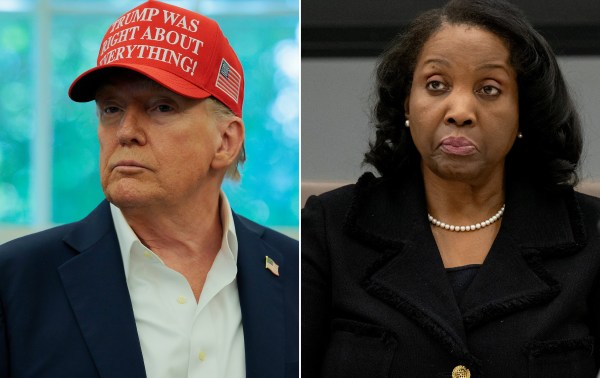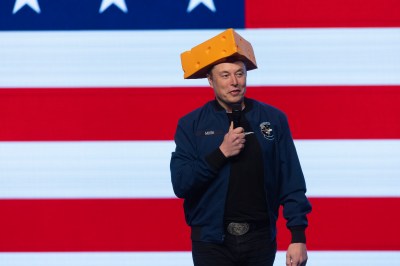Remember the last time Republicans got spooked by a Wisconsin Supreme Court election?
In 2023, nine months after Roe v. Wade was overturned, liberal Janet Protasiewicz smoked conservative Daniel Kelly by 11 points. A double-digit win in a “blue wall” swing state where important races are typically decided by a point or two struck like an earthquake. If pro-choicers were angry enough to deliver a backlash landslide in Wisconsin, imagine the sort of freakishly lopsided Democratic margins they would produce across the map on Election Day 2024.
Imagine!
You would think we’d all have learned from that not to read too much into off-year races, especially judicial contests in the Midwest. But wishcasting is 90 percent of modern politics, so last night’s easy Democratic victory in Wisconsin—and the party’s overperformance in Florida’s two House special elections—has political junkies chirping excitedly that the cursed trajectory of Donald Trump’s and Elon Musk’s co-presidency might change as a result.
And not just liberal political junkies, either.
An unnamed House Republican told Politico earlier this week that seeing his party “massacred” on Tuesday would be “a beautiful thing” because it would provide cover to swing-district GOP members to resist Musk’s government demolition project more aggressively. “Elon’s work needs to wrap up, and he needs to exit stage left,” another House Republican complained. The sentiment is understandable. Musk has become very unpopular according to any metric you can think of—polling, Tesla sales, and, yes, last night’s Wisconsin outcome.
Elon spent $25 million in the state to support Republican candidate Brad Schimel, even stooping to million-dollar giveaway stunts to generate public interest. He appeared there on Sunday for a rally and donned a cheesehead in hopes of ingratiating himself to locals. He declared on Twitter, with characteristic sobriety, that the result might determine the fate of Western civilization itself. And so the judicial race became an experiment: Having bought himself a share of presidential power last year, could the wealthiest man who’s ever lived also buy a 4-3 conservative majority on a battleground state’s highest court?
He could not. Like Kelly, Schimel was well and truly smoked, and there’s reason to believe Elon’s involvement did his candidacy more harm than good. In her victory speech afterward, liberal Susan Crawford notably identified Musk as her true opponent: “As a little girl growing up in Chippewa Falls I never could have imagined that I'd be taking on the richest man in the world for justice in Wisconsin, and we won!"
Donald Trump’s opponents are desperate to find some political entity capable of checking him and Musk. The right-wing base won’t do it; they’re too happy watching their cultural enemies be throttled. Neither will the congressional GOP, one of the sorriest nests of bootlicking cowards American politics has ever seen. The courts seem to have the guts to try, but whether they have the ability to succeed remains frighteningly unclear. And so, inevitably, the president’s critics have been led to overinterpret Tuesday’s election results: If anything might force him and his partner in crime to drastically rethink their approach, surely a stern verdict from a swing-state general electorate is it.
Lo and behold, news is breaking as I write this on Wednesday morning that Musk will be “stepping back” from his government role in the coming weeks. Elon.exe is about to be uninstalled—supposedly. Could the Trump administration be changing course?
Probably not, says Eeyore.
Consequences.
To say that the results in Wisconsin and Florida will matter less than many expect is not to say that they won’t matter at all. They will. Meaningful consequences, above and beyond Musk’s departure from DOGE, will flow from them.
Obviously they’ll boost the morale of congressional Democrats and encourage them to be more confrontational with Trump and the GOP. That process began Tuesday even before polls closed, in fact, when Sen. Cory Booker completed the longest Senate floor speech in U.S. history to protest various actions by the Trump administration. Later, Sen. Ruben Gallego announced that he’ll place a “hold” on Trump nominees for positions at the Department of Veterans Affairs until the White House rescinds plans for cuts at the agency. Then Sen. Adam Schiff placed a hold of his own on the nomination of Ed Martin, the thuggish acting U.S. attorney in D.C., to fill that position permanently.
Liberals spent the last few weeks fulminating at their party’s leaders for not doing more to obstruct Trump’s agenda. That’s now changing. The election outcomes indicated a demand for greater “resistance,” and demand tends to generate supply. And no, the outcome in Wisconsin can’t be chalked up to the usual asymmetry in which highly educated Democratic voters dutifully show up for off-year races while less educated low-propensity Republican voters stay home. The GOP actually hit its turnout target in the state; the other party simply blew the roof off.
The election results will influence Republican behavior too. Today is “Liberation Day,” of course, when the king exercises his royal prerogative to decide which foreign goods will be taxed and at what rates. A few days ago rumors swirled that he might impose a global tariff of up to 20 percent on all U.S. trading partners but instead he came in with a somewhat less ruinous 10 percent number. Elon-geddon in Wisconsin appears to have averted Trump juche, at least temporarily. It might also influence the negotiations happening between the White House and Congress over cuts to Medicaid. With the midterm forecast turning darker, the GOP might be less willing to alienate elements of its blue-collar base by canceling their health care.
Speaking of which, as others have noted, the outcomes in Wisconsin and Florida could badly damage Republicans’ ability to recruit top candidates for major midterm races in 2026. Popular former Gov. Chris Sununu might plausibly win a Senate seat in New Hampshire now that the incumbent, Jeanne Shaheen, is retiring; Gov. Brian Kemp is term-limited and would stand an excellent chance of knocking out the incumbent Jon Ossoff in next year’s Georgia Senate race. But why would Kemp or Sununu imperil their presidential ambitions by running for a statewide office in a national climate that Trump and Musk seem to be making inhospitable for Republicans?
If the two pass on those races, the GOP will be stuck with weaker nominees. Two winnable seats might stay blue, potentially deciding the Senate majority in 2027.
Boogeyman.
There’s another important consequence of last night’s results. In Musk, Democrats might at last have hit upon a Republican bogeyman who can turn out their people while not turning out right-wingers at a similar clip.
That’s been their core problem in running against Trump for nearly 10 years. They’ve lost more national elections to the president than they’ve won because “his people” will show up for him to a roughly equal or greater degree than liberals will show up to vote against him. Democrats have fared best during the Trump era when Trump himself isn’t on the ballot—flipping the House in 2018, overperforming in 2022, cleaning up in closely watched off-year races like Wisconsin’s in 2023 and 2025. Even when the GOP has done well without the president topping the ticket, as it did in Virginia’s and Georgia’s gubernatorial elections in 2021 and 2022, respectively, it was non-Trumpy candidates like Glenn Youngkin and Kemp who prevailed.
If the 2024 presidential election stands for anything, it’s that there’s literally nothing Donald Trump can do—attempt a coup, commit felonies, routinely sound like a fascist lunatic—that would give Democrats a decisive electoral advantage over him. Elon Musk, on the other hand …
For all his fame and geek adulation, Poor Elon simply doesn’t inspire the same passion on the right. Maybe that’s a function of time, with Trump enjoying a decade-long head start on him in indoctrinating right-wingers into a cult of personality. Maybe it’s a function of charisma: Trump is good on TV and Musk is not, and in a party that treats politics like pro wrestling, that’s everything. Or maybe Trump is simply easier for voters to relate to. He’s a lowbrow guy from Queens who mutters endlessly about immigrants. Elon is a nerd prone to droning on about Mars and the singularity.
They’re both extremely rich, extremely demagogic, keen to present themselves as political martyrs, and eager to use state power to own the libs, which makes them superb foils for Democrats. But Musk doesn’t have the juice to get Trumpy voters off the couch at the same clip, million-dollar giveaways or no. “Polling shows that Mr. Musk is just as unpopular among Wisconsin Democrats as Mr. Trump is,” the New York Times reported on Monday, “but without as much residual loyalty from Republicans.”
That may be the essential takeaway from last night’s results. As the president approaches retirement (we hope), it’s very uncertain whether any Republican, from J.D. Vance to Ron DeSantis to Elon Musk, can keep the MAGA coalition together once he’s gone. An unknown percentage of Americans will vote Republican for Trump and Trump alone, and that percentage may well be decisive. “When Trump is not on the ballot, our turnout problems are pretty significant,” one GOP operative admitted to Puck’s Peter Hamby. “It’s a national issue for Republicans, not just in Wisconsin.”
You can, perhaps, have “Trumpism without Trump.” But whether you can get anyone to show up for it is another matter.
Full speed ahead.
The last time a Democrat ran away with a Supreme Court election in Wisconsin, the president did something uncharacteristic. He retreated.
Nine days after Protasiewicz routed Kelly in a race that had focused on the state’s abortion policy, Trump was reportedly warning confidants that he and the GOP risked “losing big” in 2024 if they didn’t take a softer line on the issue. A week later, his campaign spokesman told the Washington Post that he wouldn’t use federal power to try to restrict abortion if reelected. He kept his distance from the subject for the rest of the campaign, gambling (correctly) that pro-lifers would roll over and support him anyway just like nearly every other conservative in the party has.
For once, it seemed, the libs had owned him.
You might reflect on that and wonder why Crawford’s rout of Schimel wouldn’t have the same effect. The president has spent his first two months back in office tearing apart the federal bureaucracy and abusing executive power to punish his enemies; his co-president in that effort did everything he could to turn the Wisconsin race into a referendum on their joint venture. Then their candidate got his clock cleaned. Time for another pivot toward moderation a la 2023, no?
Nah. Not this time.
For one thing, Trump—probably—won’t face voters again, as he was preparing to do when he pivoted away from federal abortion limits two years ago. One of his allies cited that fact this weekend when Politico asked why Trump didn’t seem more nervous about a market backlash to his “Liberation Day” tariffs. “No. 1, the president is not running for reelection—so where this may have been a political concern in his first term, it’s not a political concern now,” the source said. “And No. 2, we’re probably gonna lose the House in the midterms.”
Trump doesn’t care whether voters support his agenda or not.
The whole point of running for a second term was that, this time, he would get to do things “his way.” Instead of surrounding himself with establishment favorites like James Mattis and John Kelly, he’d appoint sycophants like Pete Hegseth and Kash Patel. Instead of paying lip service to NATO and America’s Western alliances, he’d pivot toward Russia and the authoritarian model. Instead of gesturing toward protectionism with modest tariffs, he’d go hard and make the world come begging for mercy. Instead of letting the lawyers in his ear tell him what he could and couldn’t do, he’d ship undesirables off to foreign prisons and dare the courts to do something about it.
This is a “retribution” presidency. He has a long list of people whom he’s intent on hurting, as Americans surely realized when they voted for him. An electoral setback in Wisconsin might cause him to reconsider his position on an issue he’s never much cared about, like abortion, but he’s not going to rethink the goal of “retribution.” There’d be no point to his next 46 months in office if he did.
Fatalism.
What Politico’s source said about losing the midterms regardless is also relevant.
The out-party has flipped at least one chamber of Congress in every midterm election dating back to 2006. That fact has bred fatalism in the governing party, and fatalism has bred radicalism. After all, if you’re destined to lose control of the House and/or Senate, if there’s simply no way to prevent it due to the fickle moods of the American electorate, then you might as well press your advantage by pursuing a stridently ideological agenda aggressively while you’re still in a position to do so.
For true believers, and Trump is a true believer, there’s no downside to radicalism. Maybe his program will work as great as he imagines, leading his party to overperform next fall. But even if Democrats win big, he’ll at least have the satisfaction of having accomplished the things he wanted to accomplish before legislative power was snatched away. Which, one imagines, is especially important to a president who’s embarked on a revolutionary project to usurp America’s liberal scheme of government with a postliberal one.
In fact, here’s a question: Does Trump care about the midterms at all? If you could somehow assure him that the GOP will be routed next November if he continues on the path he’s on, would he shift?
Why would he? He evinces no personal loyalty to members of Congress. Like the world, the party exists to serve him, not vice versa. He wouldn’t much miss Republican control of the House and Senate either, I suspect. He’s plainly hoping to accrue enough power in the executive branch before 2027 that having Democrats in charge of the legislature won’t matter apart from the occasional necessary compromise on raising the debt ceiling or funding the government. Even if the libs end up in charge of the Senate, potentially roadblocking his future nominees, he has ways of getting around that.
In theory, Tuesday’s election results could create an immediate problem for him in Congress by scaring swing-district Republicans away from supporting his agenda. (That’s what the “beautiful massacre” chatter I mentioned earlier is about.) But I don’t think the president is worried about that either. If you’re a moderate battleground GOPer forced to decide between angering swing voters by supporting Trump’s program and angering the right-wing base by opposing it, you’re still better off taking your chances with the first group despite the rout in Wisconsin. Swing voters might end your political career but at least they won’t murder you.
Fear is the most important incentive in modern Republican politics. It’s the only way to explain why no one was willing to convince a wildly unpopular plutocrat prone to making Nazi gestures in public that Brad Schimel might stand a better chance without him on the trail.
Which brings us to good ol’ narcissism.
The main character.
Narcissism is why I’m skeptical that Musk will leave the administration permanently and why I doubt that he’ll stop supervising DOGE’s work once he “steps away.”
It’s just not who he is. Having spent $250 million last year in hopes of placing himself at the center of American public life—successfully!—he won’t be content to go back to his old gigs of hawking ugly trucks and blowing up rockets. This is a guy whose deep need to be the main character in the “public square” led him to pay $44 billion to purchase his own social media platform, which he promptly set about ruining.
Elon sees himself (with justification) as a master of the universe, a man of action who makes things happen that shake the world through sheer force of will. He might take a little time off from politics to try to prevent the bottom from falling out at Tesla, but I’d bet anything that he’ll be back spending mega-bucks next fall on Republican candidates to reestablish his influence over the right.
And really, why not? The fallout from DOGE’s cuts will be felt for years to come, guaranteeing that Democrats will treat him as a star boogeyman in next year’s campaign. He’ll be a factor in the midterms whether or not he participates. So he probably will.
All of that goes for Donald Trump as well, needless to say. I’m convinced that the president is convinced that, one way or another, he’s not leaving office in 2029. However he contrives to stay on, as he nearly succeeded in doing in 2020, he too has been reinforced by the American people in his terrible belief that you can get anything you want if only you insist on it ruthlessly enough. He’ll be the main character in our politics so long as he has breath left in him.
He’ll continue to insist, with increasing ruthlessness, on what he wants for the duration of his presidency, and we’re all going to find out the hard way whether his belief is justified or not. No election will stop him.







Please note that we at The Dispatch hold ourselves, our work, and our commenters to a higher standard than other places on the internet. We welcome comments that foster genuine debate or discussion—including comments critical of us or our work—but responses that include ad hominem attacks on fellow Dispatch members or are intended to stoke fear and anger may be moderated.
With your membership, you only have the ability to comment on The Morning Dispatch articles. Consider upgrading to join the conversation everywhere.